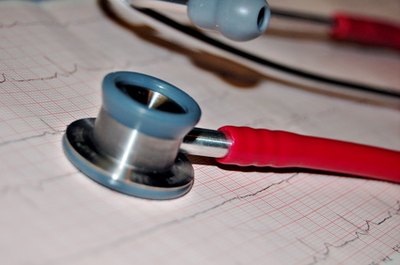Author
by
http://www.livestrong.com/article/220354-causes-of-a-racing-heart/
by
A rapid heart beat, medically known as tachycardia, may arise for many different reasons. The heart normally beats between 60 and 100 times per minute, and a heart rate greater than 100 beats per minute defines tachycardia. Symptoms of tachycardia may include palpitations, sensation of the heart pounding, dizziness and lightheadedness, or there may be no obvious symptoms. In some scenarios, a rapid heart beat is normal, such as during exercise. However, if the heart races for an unknown reason, it may suggest an underlying problem and warrants investigation with a health care provider.
Infection
Various types of infection may cause a rapid heart rate. The heart rate is mandated by a complex interplay among the nervous, endocrine and immune systems. During an infection, the body initiates an immune response, which affects these systems, resulting in an increased heart rate. Possible infections include an acute cold or flu, long-term illness, or other low-grade inflammation.
Anxiety
Anxiety can cause the heart to beat faster. Anxiety may be a short-term result of a stressful life event, or it may persist for longer periods, perhaps without an obvious reason. Women are more susceptible to feeling anxious than men. Besides feeling a racing heart beat, anxious individuals often experience restlessness, difficulty concentrating, irritability, muscle tension and sleep difficulty. Other symptoms may include sweating, shortness of breath, chest pain or a sensation of "butterflies in the stomach."
Substance Use
Ingesting certain substances can lead to an increased heart rate. They work by affecting the central nervous system, one of the regulating systems of the body. Caffeine and tobacco are common reasons for tachycardia. Other substances that increase the heart rate include some recreational drugs, certain pharmaceutical drugs and alcohol.
Thyroid Condition
The thyroid gland makes and stores hormones that regulate blood pressure, body temperature, and cellular metabolism. The thyroid also plays a role in regulating the heart rate. When the thyroid gland is overactive, a condition known as hyperthyroidism, a racing heart may result. Other symptoms of hyperthyroidism include weight loss, anxiety, heat intolerance, sweating, and hair loss. A simple blood test can check for hyperthyroidism.
Cardiovascular Condition
A rapid heart beat may result from damage directly to the heart, blood stream or blood vessels. One cause, for instance, is anemia, where there is a deficiency of red blood cells and associated oxygen-carrying capacity. Anemia can result from nutritional deficiencies or chronic disease, or for a variety of other reasons. Other heart-related causes of tachycardia are coronary artery disease, heart valve disease, heart muscle disease, congenital abnormalities, heart failure, pulmonary embolism and congestive heart failure. These conditions can have serious complications and should be evaluated and managed by a health care professional.
Love
A rapid heart beat does not necessarily point to a grave abnormality. Many people experience a racing or fluttering pulse at the sight of a loved one.
http://www.livestrong.com/article/220354-causes-of-a-racing-heart/








No comments:
Post a Comment